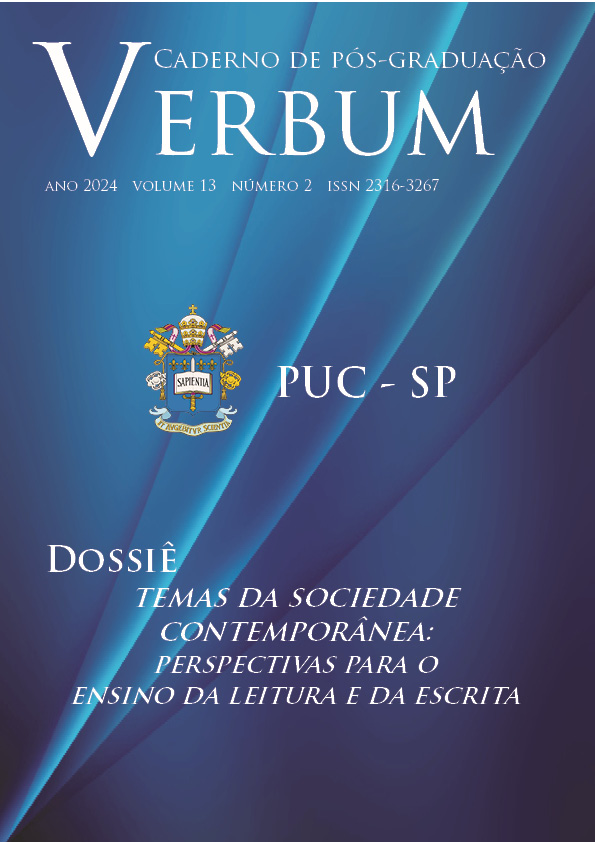PRÁTICAS DE ESCRILEITURA DE FAKE NEWS NO UNIVERSO DIGITAL
DOI:
https://doi.org/10.23925/2316-3267.2024v13i2p54-72Keywords:
Read-Writing. Ecosystem. Fake news. Technodiscourse.Abstract
This article discusses how linguistic and computer elements of technodiscourses working together to construct the meanings of fake news published on X, and reflects on which skills should be developed in teaching reading and writing texts native to the digital environment. Based on the assumptions of Textual Linguistics in interface with Digital Discourse Analysis, the ecosystem analysis methodology (Paveau, 2021) of native digital textuality was adopted. Fake news seems to have found a favorable environment for production and dissemination in the digital universe, using platform tools and resources in co-operation with language elements to construct the possible meanings intended by the enunciator and carried out by the read-writers.
References
AMOSSY, Ruth. Apologia da polêmica. Coordenação da tradução: Monica Magalhães Cavalcante; tradução: Rosalice Botelho Walkim Souza Pinto et. al. São Paulo: Contexto, 2017.
COSTA, Júlia Lourenço; BARONAS, Roberto Leiser. Apresentação da edição brasileira. In: PAVEAU, Marie-Ann. Análise do discurso digital: dicionário das formas e das práticas. Campinas: Pontes, 2021. p. 19-26.
BENTES, A. C.; SOUZA-SANTOS, J. E. de. Fake news como produção textual disruptiva: os abalos nos campos sociais. Cadernos de Estudos Linguísticos, Campinas, SP, v. 65, n. 00, p. 023014, 2023. DOI: 10.20396/cel.v65i00.8673341. Disponível em: <https://periodicos.sbu. unicamp.br/ojs/index.php/cel/article/view/8673341>. Acesso em: 10 fev. 2024.
CARVALHO, Ana Paula Lima de. Sobre intertextualidades estritas e amplas. Tese de doutorado. 135 fl. Universidade Federal do Ceará, Centro de Humanidades, Programa de Pós-Graduação em Linguística, Fortaleza, 2018.
CHARAUDEAU, Patrick. "A patemização na televisão como estratégia de autenticidade", in Mendes E. & Machado I.L. (org.), As emoções no discurso, Mercado Letras, Campinas (SP), 2007. Disponível em http://www.patrick-charaudeau.com/A-patemizacao-na-televisao-como.html. Acesso em 14 ago 2023.
CHARAUDEAU, Patrick. A manipulação da verdade: do triunfo da negação às sombras da pós-verdade. Tradução: Dóris de Arruda C. da Cunha e André Luís de Araújo. São Paulo: Contexto, 2022.
COSTA, Júlia Lourenço; BARONAS, Roberto Leiser. Apresentação da edição brasileira. PAVEAU, Marie-Ann. Análise do discurso digital: dicionário das formas e das práticas. Campinas: Pontes, 2021.
CUSTÓDIO FILHO, Valdinar. Referenciação intertextual: análise da construção de objetos de discurso em narrativas com episódios. ReVEL, vol. 13, n. 25, 2015. [www.revel.inf.br].
ELIAS, Vanda Maria; CAVALCANTE, Mônica Magalhães. Linguística textual e estudos do hipertexto: focalizando o contexto e a coerência. In: CAPISTRANO JUNIOR, Rivaldo; LINS, Maria da Penha Pereira; ELIAS, Vanda Maria (orgs.). Linguística textual: diálogos interdisciplinares. São Paulo: Labrador, 2017.
FAKE News. In: Dicionário Merriam-Webster. On-line. “The Real Story of 'Fake News'”, 23 de março de 2017. Disponível em <https://www.merriam-webster.com/words-at-play/the-real-story-of-fake-news> Acesso em 02 out. 2022.
LOBATO, Gisele. É falso que torcidas organizadas farão ato pró-democracia durante manifestação convocada por Bolsonaro. Aos Fatos. 15 de fevereiro de 2024, 17h21. Disponível em <https://www.aosfatos.org/noticias/falso-torcidas-organizadas-ato-democracia-manifestacao-bolsonaro/?utm_source=aosfatos&utm_campaign=c95aadd946-EMAIL_CAMPAIGN_2024_02_15_09_30&utm_medium=email&utm_term=0_b221809dd3-c95aadd946-%5BLIST_EMAIL_ID%5D> Acesso em 15 fev. 2024.
MONDADA, L.; DUBOIS, D. Construção dos objetos de discurso e categorização: uma abordagem dos processos de referenciação. In CAVALCANTE, M. M.; RODRIGUES, CIULLA, A.; (Org.). Referenciação. São Paulo: Contexto, 2003. p. 17-52.
PAVEAU, Marie-Ann. Análise do discurso digital: dicionário das formas e das práticas. Campinas: Pontes, 2021.
SHU, Kai; SILVA, Amy; WANG, Suhang; TANG, Jiliang; LIU, Huan. Fake News detection on Social Media: a data mining perspective. 2017. Disponível em < https://www.researchgate .net/publication/342754515_The_Future_of_False_Information_Detection_on_Social_Media_New_Perspectives_and_Trends>. Acesso 14 jun 2021.
TANDOC Jr., Edson C.; LIM, Zheng Wei; LING, Richard. Defining ‘Fake News’: A Typology of Scholarly Definitions, Digital Journalism. Fev. 2018. 6 (2). pp. 137-153. Disponível em: https://resolver.scholarsportal.info/resolve/21670811/v06i0002/137_dn.xml. Acesso 12 abr de 2021.
Downloads
Published
Versions
- 2024-09-20 (3)
- 2024-08-19 (2)
- 2024-08-19 (1)


